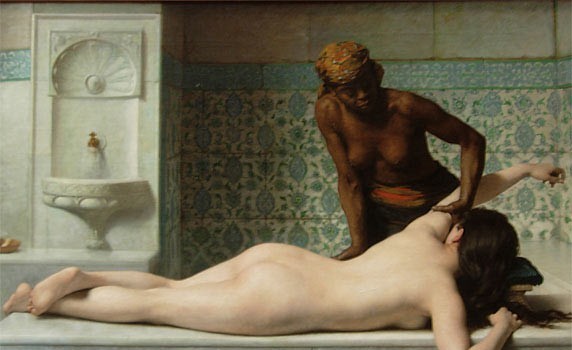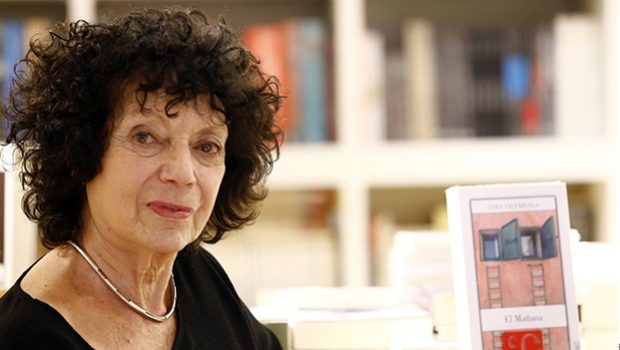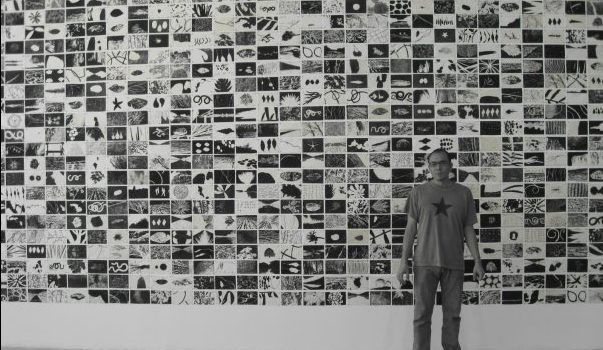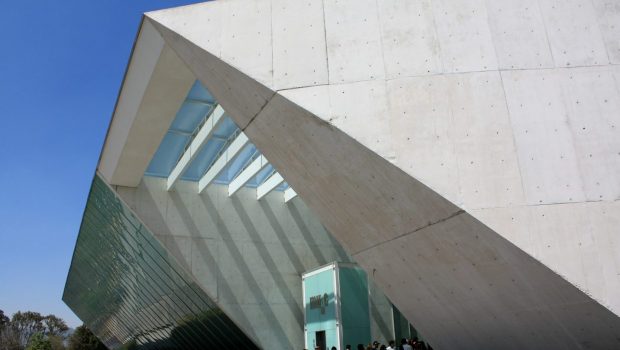Alberto Ruy Sánchez: Erotic Imagination
La imaginación erótica
Rose Mary Salum
Con la reciente publicación de Nueve veces el asombro (Alfaguara, México), Alberto Ruy Sánchez enriquece el mundo imaginario del deseo: Mogador, el escenario por el cual circula la imaginación erótica del lector, es una mujer descrita como ciudad y una ciudad que ya es símbolo de la sensualidad poética. Desde la publicación de su primera novela Los nombres del aire (1987), Ruy Sánchez también inicia una carrera que estará repleta de reconocimientos tanto por su labor de escritor como de editor. Su obra ha sido traducida a varios idiomas y distinguida por la Fundación Guggenheim en Nueva York, el Premio Xavier Villaurrutia (el reconocimiento más prestigioso de narrativa en México), la Universidad de Louisville en Kentucky, la Fundación Tinker a través de la Universidad de Stanford. El Gobierno de Francia lo condecoró como Officier de l’Ordre des Arts et des Lettres.
A continuación una conversación con el escritor mexicano.
* * *
Rose Mary Salum: La numerología está presente en su trabajo, específicamente, el número nueve ha ido cobrando presencia en su narrativa hasta ser parte de la estructura formal del último libro Nueve veces el asombro. ¿Por qué el nueve?
Alberto Ruy Sánchez: Mi elección del nueve tiene su origen en la estética, no tiene nada que ver con la Esoteria. Por eso aflora naturalmente en la estructura de los libros. Ese es su lugar. El primero de ellos. Es una elección proporcional. Como un pintor que elige hacer un cuadro de dos por dos en vez de diez por catorce o cualquier otra cifra. Cada elección proporcional conduce a una forma con consecuencias estéticas distintas. No es lo mismo una obra rectán- gula que una cuadrada, por ejemplo, una pequeña que una grande.
Ahora bien, esa elección tiene muchas implicaciones distintas. La primera es que desde el comienzo asumo que la extensión o la brevedad de un libro es siempre producto de una elección. Cuando hablo con escritores me doy cuenta de que la mayoría ni se preocupa por el número de capítulos que tendrá su libro. Como si diera lo mismo. Muchos siguen creyendo que un relato es reflejo de una realidad y que esa realidad determina la extensión del libro. Otros creen que escribir es como hablar y que hay una “naturalidad” que se va dando al avanzar en su relato. Pero no hay ninguna habla natural. Todos hablamos con un acento y un léxico regional distintos. ¿Cuál es más natural que otro? Yo parto del principio de que ser escritor es crear una composición. Soy un compositor narrativo y en cualquier composición la forma, la proporción, es fundamental.
Cuando decidí hacer una exploración del deseo en varios volúmenes, tuve que encontrar una retícula interna, un principio estructural ordenador que me permitiera, a lo largo de los años, ensamblar materiales distintos y seguir en la dinámica de la misma composición. Buscando en el mundo de las estructuras anatómicas de los animales encontré que el nueve ayuda a generar la espiral en ciertos animales como el caracol nautilus y que está presente en la estructura interna y el crecimiento de muchos otros. Y en el mundo artesanal marroquí, que inspira en gran parte mi concepción del trabajo artístico, encontré que los grandes maestros azulejeros, los maalems, para hacer tableros de azulejos ensamblando noventa y nueve formas geométricas y de colores distintos usan una retícula muy antigua basada en el nueve y que se llama “cuadrado védico”. Desde Los nombres del aire, la estructura de mis libros usa el nueve como principio armónico, como elemento ordenador. Hay otras implicaciones pero ya es demasiado larga esta respuesta. Hiciste una pregunta fundamental para mi obra.
R. M. S.: De Los nombres del aire a Nueve veces el asombro han pasado 18 años. Desde su punto de vista ¿existe aún terreno por explorar en la temática del deseo y cuáles serían esas áreas?
A. R. S.: Mis libros apenas atisban en el mundo del deseo que es cambiante y tiene mil caras. Dentro de mi plan, me queda por escribir todas aquellas observaciones que he ordenado bajo el signo del fuego: el deseo tan ardiente que ya no puede ser dicho, que consume la vida. Pero cada uno de mis libros avanza no sólo recorriendo más temas sino ampliando el punto de vista del narrador. Me falta una dimensión narrativa que añada a lo sublime del deseo un ámbito de ironía, de burlarse de sí mismo. Eso está un poco ya en En los labios del agua, pero vendrá con más fuerza en el siguiente libro, el del fuego. También me hace falta reescribir el último libro, el que cuenta el origen y crecimiento del deseo de escribir estos libros que en un principio se llamó ARS de cuerpo entero y que se llamará Mi palma en la arena. Me faltan algunos relatos laterales y breves y un libro de poemas que cuentan los sueños eróticos de los sonámbulos: Espiral de sueños. Será una exploración del delirio amoroso que se tiene cuando se hace el amor. Un libro experimental más que imaginativo, aunque todo parezca como un sueño. Y aún terminado mi proyecto no cubrirá todos los temas del deseo que es posible explorar.
R. M. S.: Según Rougemont el erotismo sólo accede al nivel de la conciencia en occidente a comienzos del siglo XIX. Desde entonces ¿en qué lugar se colocaría a sí mismo dentro de la literatura erótica mexicana?
A. R. S.: Lo que Denis de Rougemont analiza y describe a partir del “Amor Cortés” ya existía en muchas otras tradiciones y notablemente en la árabe con un libro que parece hecho para ilus- trar sus teorías pero que fue escrito varios siglos antes: Majoun, el loco de Lieila. ¿Cómo me sitúo? Desde luego no me pienso a mí mismo como ajeno a la tradición arábigo andaluza que marcó ocho siglos de la vida de España antes del descubrimiento de América, es decir de nuestra lengua y nuestra literatura. Esa es mi tradición, no la renacentista. México es extremo occidente, no occidente. Y el mundo árabe no es oriente. Especialmente el mundo arábigo andaluz. El norte de África se llama a sí mismo Magreb, que quiere decir Occidente. No me considero parte de la literatura erótica mexicana sino de la literatura amorosa de nuestra lengua, la que se habla ahora mayoritariamente en el continente americano. El español peninsular, el de España, se ha vuelto una lengua regional.
R. M. S.: En la geografía de la imaginación, en ese lugar en donde se ubica Mogador y el deseo, el erotismo encuentra tierra fértil ¿es el erotismo, otro camino para acceder a lo espiritual?
A. R. S.: En la tradición arábigo andaluza, en un Islam que no era el fundamentalista que ahora domina al mundo árabe como su caricatura, se llegaba Dios a través del sexo. Libros fundamentales como El collar de la paloma, de Ibn Hazm, del siglo XII, son manuales amorosos llenos de espiritualidad a través del cuerpo y sus posibilidades de goce. Gozar nos mejora y el amor es una forma de conocimiento en varias dimensiones que incluye la mística, la tendencia a una trascendencia, a ir a través de quien amamos y con quien amamos hacia algo que nos rebasa.
R. M. S.: En una descripción geográfica y no menos poética en Nueve veces el asombro Mogador deja de ser el escenario del deseo para convertirse en el personaje de la obra. ¿Podría ahondar más en esta idea?
A. R. S.: Desde el primer texto que escribí sobre Mogador, “La Inaccesible”, la ciudad se convirtió en metáfora de una mujer deseada. Eso está presente en Los nombres del aire y en todos los libros de la serie. A una ciudad como Mogador nunca se le posee aunque se esté dentro de ella, siempre hay algo más que entender. Hay que apagar el motor para acercarse y entrar en ella si sus mareas nos invitan. Hay que escu char las señales que vienen de la ciudad hacia nosotros mientras navegamos hacia ella. En fin, toda la descripción de la ciudad ha sido considerada una descripción erótica. Y tal vez lo sea. Cada quien lo lee en la medida de sus propios deseos de verlo. Para mí lo esencial es que el mundo está erotizado y es poético incluso en lo que tiene de terrible si sabemos verlo. Erotismo es afirmación de la vida. Si sabemos distinguir claramente esa afirmación del resto estamos erotizando al mundo en un sentido más amplio de la palabra. Y Mogador es el establecimiento de un universo erotizado, como si fuera una persona amada pero también como escenario vibrante de las pasiones entre los amantes de los libros.
R. M. S.: Su trabajo literario ha hecho aportaciones significativas para la cultura mexicana, pero además es un editor con trayectoria, primero en Vuelta y ahora en Artes de México. ¿Qué piensa del mundo editorial de nuestros días?
A. R. S.: Trabajo activamente para que las legislaciones fiscales de los últimos gobiernos de México no aniquilen al mundo editorial mexicano que se encuentra englutido por los grandes grupos obviamente. La descripción terrible del mundo editorial que hace Alain Schiffrin en su libro La edición sin editores es muy certera pero la realidad va siendo peor.
R. M. S.: ¿Cuál es su opinión sobre la nueva narrativa, la relación de ésta con los medios y la mercadotecnia a la luz de los nuevos y grandes grupos editoriales como Planeta, Mondadori, Anaya, etc.?
A. R. S.: “La nueva narrativa” es un mundo que no cabe en una sola descripción. Hay áreas completas del mundo que nos dan todos los días grandes sorpresas. Para mí, por ejemplo, la narrativa más nueva y fresca está en la literatura actual de los Balcanes, escritores serbios como Goran Petrovic alegran mis días. Por supuesto no están traducidos al inglés que es la lengua a la que menos literatura viva del mundo se traduce actualmente.
Por otra parte están los agentes y los grandes grupos editoriales. Creo que con frecuencia en ellos la calidad se deja de lado por libros que dejen ganancias más inmediatas. Eso es lógico en el mundo de los negocios. Lo malo es que tiende a uniformar ciertas escrituras cuando los autores anhelan más el éxito económico y de prestigio mediático que el deseo de hacer una obra de arte literario que sea significativa para el artista y sus lectores, muchos o pocos. De vez en cuando coinciden los dos mundos, el de la calidad y el del gran público. Pero la mayoría de las veces se separan.
R. M. S.: La migración del último siglo ha introducido el idioma inglés al discurso literario latinoamericano. ¿Qué piensa de este fenómeno y en su opinión cuál es su importancia?
A. R. S.: El español está vivo y tiene que impregnarse de todo lo que lo rodea, incluyendo el inglés. Mientras no se empobrezca sino que se vuelva más rico, será un fenómeno positivo. El problema no es el inglés, que es una lengua rica y viva. El problema es que nuestra cultura se impregne de concepciones derivadas de una mentalidad estrecha muy común en el mundo de los negocios dominante mundialmente: por ejemplo esa tendencia a creer que los libros se dividen entre ficción y no-ficción. Es una cosa tan extraña desde otras culturas y se deriva claramente de sectas lectoras de la Biblia que creen que la verdad es una realidad simple cuando es una de las realidades más complejas que tienen los humanos. Uno de esos libros considerados de no-ficción puede ser menos real y verdadero que una novela. Como aquello que los soviéticos llamaban “Realismo Socialista” y que ahora incluye novelas tan claramente alejadas de la realidad pero conformes con una ideología del momento. Por otro lado, una buena novela del siglo XIX nos habla de cómo se sentía y se pensaba en ese siglo con mayor fuerza que muchos de los ensayos históricos o reportajes escritos entonces. La lengua no es un peligro, la retícula mental angloprotestante, en el sentido descrito por Max Weber, sí lo es.
R. M. S.: ¿Podría compartir con nosotros alguna anécdota que recuerde especialmente de su trato con Octavio Paz?
A. R. S.: Son tantas que me cuesta trabajo elegir una. Él era siempre sorpresivo y lúcido, cordial y apasionado.
Un día le dieron un premio importante y lo felicité. Se pasó media hora diciéndome que no merecía la felicitación porque todos los reconocimientos, o la falta de reconocimiento, eran un equívoco. Nunca se premia verdaderamente aquello por lo que se hizo el libro o la obra. Siempre es por otra cosa que se sobrepone. Al día siguiente me dieron un premio, el Xavier Villaurrutia. Y Octavio me habló para felicitarme. Me quedé sorprendido y sonriendo le pregunté si había olvidado todo lo que me dijo el día anterior sobre los premios y el hecho de que siempre son un equívoco. Si lo recordaba ¿por qué me felicitaba entonces? Él me respondió: “Claro que lo recuerdo y lo reitero. Pero te felicito porque más vale un equívoco feliz que uno infeliz”.
R. M. S.: La pregunta obligada: ¿se encuentra trabajando en algún proyecto nuevo?
A. R. S.: Estoy terminando la novela del fuego en el ciclo de Mogador donde cada libro está vinculado a un elemento: La mano del fuego. Mi mayor influencia literaria, Samuel Beckett, escribió que el arte literario tiene sentido sólo si examina su propia posibilidad de ser dicho. Algo terriblemente válido para el amor extremo, el que nos consume. Tengo un personaje que es una especie de místico erótico, un hombre barroco que vive plenamente su religión donde las mujeres son sus diosas y que logra acariciarlas hasta con la mano que no tiene, la izquierda. Hay un narrador que es redactor de una revista erótica excéntrica, El jardín perfumado, especie de Play Boy alternativo con menos rubias y más costumbres amorosas de otros pueblos. Este redactor odia la literatura erótica, el concepto mismo le causa repugnancia. Pero la vida le da ocasiones erótico literarias todo el tiempo que lo desconciertan y lo hacen reconocerse ridículo. El ridículo de los enamorados cuando su pasión es vista desde fuera. El redactor antierótico es hijo del místico erótico, pero él no lo sabe. Todavía.
También escribo continuamente ensayos sobre artistas y sobre cultura mexicana en general a través de Artes de México.
Trabajo desde hace años en un ensayo largo sobre la condición ritual de la escritura poética.
 Rose Mary Salum es la fundadora y directora de Literal, Latin American Voices. Es la autora de El agua que mece el silencio (Vaso Roto 2015) y Delta de las arenas, cuentos árabes, cuentos judíos (Literal Publishing 2013) entre otros. Su twitter @rosemarysalum
Rose Mary Salum es la fundadora y directora de Literal, Latin American Voices. Es la autora de El agua que mece el silencio (Vaso Roto 2015) y Delta de las arenas, cuentos árabes, cuentos judíos (Literal Publishing 2013) entre otros. Su twitter @rosemarysalum
Translated to English by Angela McEwan
With the recent publication of Nueve veces el asombro (Alfaguara, Mexico), Alberto Ruy Sánchez enriches the imaginary world of desire: Mogador, the setting where the reader’s erotic imagination lingers, is a woman described as a city, and a city that is already a symbol of the most poetic sensuality. Since the publication of his first novel Mogador: The Names of the Air (1987), Ruy Sánchez begins a career full in decorations for his work, both as a writer and as an editor. His books have been translated to many languages, and have been recognized by the J.S. Guggenheim Foundation of New York, the University of Louisville in Kentucky, the Tinker Foundation through Stanford University, he has won the Xavier Villaurrutia Prize, the most prestigious literary recognition in Mexico, and the French Government honored him as Officier de l’Ordre des Arts et des Lettres.
The following is a conversation with the Mexican writer.
* * *
Rose Mary Salum: Numerology is present in your work, specifically speaking, the number nine has increasingly been a part of your narrative work, even to the point of forming part of the formal structure of your latest book, Nueve veces el asombro (Nine Times Amazed). Why nine?
Alberto Ruy Sánchez: My choice of the number nine has its origin in aesthetics; it has nothing to do with Esoterics. For that reason it develops naturally in the structure of the books. That is its place. The main one. It is a choice of proportion, as when a painter chooses to make a painting that is two by two instead of ten by fourteen or any other size. Each choice of proportion leads to a form with different aesthetic consequences. For example, a rectangular work is not the same as a square one, nor is a small one the same as a large one.
Now that choice has many implications. The first is that at the beginning I take it for granted that the length or brevity of a book is always the result of making a choice. When I talk with writers I realize that most of them don’t worry at all about the number of chapters their book is going to have. As if it were all the same. Many continue believing that a story is a reflection of a reality and this fictional reality determines the length of the book. Others believe that writing is like speaking, and that there is a “naturalness” created as the story progresses. But there is no such thing as natural speech. We all speak with different regional accents and lexicons. Which one is the most natural? I start from the basis that to be a writer is to create a composition. I am a narrative composer and in any composition the form, the proportion, is fundamental.
When I decided to explore the nature of desire in several books, I had to find an internal framework, a basic organizing structure which would allow me, over the course of years, to assemble different materials and continue the same dynamics of the composition. Searching in the world of anatomic structures of animals, I found that the number nine helps to generate a spiral in certain creatures, such as the chambered nautilus, and is present in the internal structure and growth of many others. Adittionally in the Moroccan artisan world, which greatly influences my concept of artistic work, I found that the master tile makers, the maalems, would make mosaic designs by assembling 99 geometric forms of different colors, using a very ancient layout based on the number nine called the “Vedic square.” Starting with Los nombres del aire (The Names of the Air), published in English as Mogador: The Name of the Air the structure of my books makes use of the number nine as a harmonic principle, an organizing element. There are other implications, but this answer is already too long. You asked a question that is fundamental to my work.
R. M. S.: Eighteen years have passed between Los nombres del aire and Nueve veces el asombro. From your point of view, are there still areas to explore on the theme of desire, and what would those areas be?
A. R. S.: My books barely offer a glimpse into the world of desire, which is changeable and presents a thousand faces. Within my plan, I still have to write all those observations that I have organized under the sign of fire: desire which is so burning that it can’t be spoken, which consumes one’s life. But each one of my books progresses by not only covering more themes, but also widening the point of view of the narrator. I still don’t have a narrative dimension that would contribute to the sublimity of desire an element of irony, of making fun of oneself. There is a little of that in En los labios del agua (On the Lips of Water), but it will appear even more noticeably in the next book, the one of fire. Also, I need to rewrite the last book, which tells of the origin and growth of the desire to write these books (which as a whole at the beginning was called ARS) and which will be called Mi palma en la arena (My Palm in the Sand). I am missing some short related stories and a book of poems which describe the erotic dreams of the sleepwalkers: Espiral de sueños (Spiral of Dreams). It will be an exploration of the amorous delirium one experiences when making love. A book that is more experimental than imaginative, although it all seems like a dream. And even when I finish my project, it won’t cover all the themes of desire that could be explored.
R. M. S.: According to Rougemont, eroticism only entered Western consciousness at the beginning of the nineteenth century. With that in mind, where would you place yourself within Mexican erotic literature?
A. R. S.: What Denis de Rougemont analyzes and describes starting with “Courtly Love” already existed in many other traditions, notably in the Arabic, with a book which seems made to illustrate his theories, but which was written several centuries earlier: Majoun, el loco de Lieila (Majoun, the Crazy Man of Lielia). Where do I place myself? Of course, I don’t consider myself as separate from the Arabic-Andalusian tradition, which left its mark on eight centuries of Spanish life before the discovery of America, that is, on our language and literature. That’s my tradition, not the Renaissance tradition. Mexico is far west, not western. And the Arab world is not eastern, especially the Arabic-Andalusian world. North Africa calls itself Magreb, which means the West. I don’t consider myself part of Mexican erotic literature, but rather the romantic literature of our language, which is now spoken mainly on the American continent. Peninsular Spanish, the language of Spain, has become a regional language.
R. M. S.: In the geography of the imagination, in that place where Mogador and desire are located, eroticism finds fertile soil. Is eroticism another road to spirituality?
A. R. S.: In the Arabic-Andalusian tradition, in an Islam that was not the fundamentalism which now dominates the Arab world like a caricature of itself, God was reached through sex. Fundamental books, such as El collar de la paloma (The Necklace of the Dove) by Ibn Hazm, of the twelfth century, are manuals of love full of spirituality by means of the body and its possibilities of pleasure. The enjoyment of pleasure makes us better, and love is a form of knowledge in various dimensions, including mysticism, the tendency of transcendence, to go through and with the loved one toward something that fills us to overflowing.
R. M. S.: In a geographic but nevertheless poetic description in Nueve veces el asombro Mogador is no longer the setting of desire but becomes a character in the work. Could you expand on this idea?
A. R. S.: From the first lines that I wrote about Mogador, “La inaccesible” (The Inaccessible), the city became a metaphor for a desirable woman. That is present in Los nombres del aire and in all the books of the series. A city like Mogador is never possessed, as even when one is in it there is always something more to understand. You have to turn off the motor to come closer and enter it, if its tides invite you. We have to listen to the signals coming to us from the city as we sail towards it. That is, the whole description of the city has been considered an erotic description, and it just might be true. One reads it according to their own desire to see it. For me, what is essential is that the world is eroticized and poetic, even in what is terrible, if we know how to see it. Eroticism is an affirmation of life. If we can distinguish that affirmation clearly from the rest, we are eroticizing the world in a wider sense of the word. And Mogador is the establishment of an eroticized universe, as if it were a beloved person, but also as the vibrant setting for the passions of the lovers in the books.
R. M. S.: Your writing has contributed significantly to Mexican culture, but you are also an editor with a track record, first at Vuelta and now at Artes de México. What do you think of today’s editorial world?
A. R. S.: I work actively to keep the fiscal legislation of the recent governments of Mexico from annihilating the Mexican editorial world which is obviously being swallowed up by the large groups. The description of the terrible state of the editorial world given by Alain Schiffrin in his book La edición sin editores ( Editing Without Editors) is very accurate, but the reality is getting worse.
R. M. S.: What is your opinion on the new narrative, its relationship to the media and marketing in light of the new, large editorial groups like Planeta, Mondadori, Anaya, etc.?
A. R. S.: “The new narrative” is a world that doesn’t fit in one single description. There are entire aspects of that world that surprise us greatly every day. For me, for example, the newest and freshest narrative is in the current literature of the Balkans. Serbian writers like Goran Petrovic brighten my days. Of course, they haven’t been translated into English, which is the language into which less world literature is translated than any other at present. In addition, there are the agents and the large editorial groups. I think that often they leave quality to one side in favor of books that offer more immediate profits. That’s logical in the business world. The bad part is that it tends to homogenize certain writing when the authors are motivated more by the desire for financial success and media prestige than by the desire to create a literary work of sig- nificance for both artist and readers, whether many or few. Once in a while both worlds coincide, that of quality as well as the marketing aspect. But most of the time they are separate.
R. M. S.: The migration of the last century has introduced the English language to Latin American literary discourse. What do you think of this phenomenon and in your opinion what is its importance?
A. R. S.: Spanish is alive and absorbs everything around it, including English. As long as it doesn’t become poorer for it but is enriched, it will be a positive phenomenon. The problem is not English, which is a rich, living language. The problem is that our culture absorbs concepts derived from a narrow-minded mentality, very common in the business world and dominant throughout the world: for example the tendency to believe that books are divided between fiction and non-fiction. It’s a very strange thing for other cultures and clearly comes from those Bible-reading sects which believe that truth is a simple reality, when it is one of the most complex human realities that exists. One of those books considered non-fiction could be less real and true than a novel. Like what the Soviets used to call “Socialist Realism,” which now includes novels very clearly removed from reality, but conforming to the ideology of the moment. On the other hand, a good nineteenth century novel tells us how people felt and thought in that century more powerfully than many of the historical essays or news reports written at the time. Language itself is not a danger; the anglo-protestant mindset, in the sense described by Max Weber, is.
R. M. S.: Could you share with us some anecdote you particularly remember about Octavio Paz?
A. R. S.: There are so many, it’s hard for me to choose one. He was always surprising and enlightening, cordial and passionate. One day he received an important award and I congratulated him. He spent half an hour telling me that he didn’t deserve the congratulations, because all recognition or the lack of it was mistaken. Awards are never given for that for which the book or the work was created. It’s always for something else that is superimposed. The next day I received a prize, the Xavier Villaurrutia. And Octavio called to congratulate me. I was surprised and asked him with a smile if he had fogotten all he had told me the day before about prizes and the fact that they are always a mistake. If he remembered it, then why was he congratulating me? He replied, “Of course I remember it and I reiterate it. But I congratulate you because a happy mistake is better than an unhappy one.”
R. M. S.: And now, the obligatory question: are you currently working on some new project?
A. R. S.: I’m finishing the novel of fire in the Mogador cycle in which each book is linked to an element: La mano del fuego (The Hand of Fire). My major literary influence, Samuel Beckett, wrote that the art of literature makes sense only if it examines its own possibility to be stated. This is so very true for extreme love, the consuming kind. I have a character who is a kind of erotic mystic, a baroque man who lives his religion to the fullest. The women are his goddesses and he manages to caress them even with the left hand that he does not have. There is a narrator who edits an eccentric, erotic magazine, El jardín perfumado (The Perfumed Garden), a kind of alternative Playboy with less blondes and more amorous traditions from other countries. This editor hates erotic literature, the concept itself is repugnant to him. But life gives him literary erotic moments all the time which he finds disconcerting and which make him feel ridiculous, the way lovers appear when their passion is seen from outside. The anti-erotic editor is the son of the erotic mystic, but he doesn’t know it. Not yet, at least.
Also, I constantly write essays about artists and Mexican culture in general in Artes de México.
I have been working for years on a long essay on the ritual condition of poetic writing.










